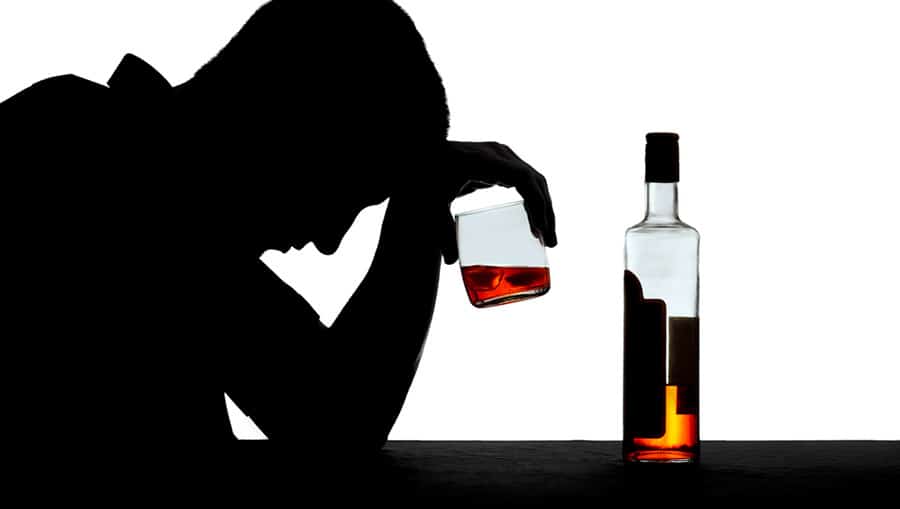What is the first step toward getting treatment for Alcohol Addiction?
Alcohol use disorder (AUD) is defined as a chronic disease in which a person is unable to control excessive consumption of alcohol, has constant thoughts about alcohol or drinking and continues to drink alcohol despite experiencing negative consequences. In the U.S., an estimated 15 million adults suffer from alcohol addiction, according to the National Institute of Alcohol Abuse and Alcoholism. Alcohol addiction can have serious effects on both the mind and body.
What are the first signs of alcoholism? How do you know when it’s time to seek out treatment? Oftentimes, individuals who are abusing alcohol are unaware of their addiction or are in denial of their addiction. For many, the first step into recovery can be the most challenging step both physically and emotionally. When diagnosing possible signs of alcohol addiction, many healthcare professionals will use criteria from the Diagnostic and Statistical Manual of Mental Disorders, Fifth Edition (DSM-5) where the following questions might be asked to determine the severity of the addiction.

Check Your Insurance Coverage for FREE
Find out if your insurance covers addiction treatment in minutes. We accept most insurance!
Within the past year:
1. Have there been times when you end up drinking more or longer than you intended?
2. Have you wanted to cut down on drinking or tried to stop more than once, but were unable to?
3. Do you spend a lot of time drinking?
4. Have you experienced cravings or a strong urge to drink?
5. Has drinking or being sick from drinking interfered with your daily professional and personal obligations?
6. Have you continued to drink even after it caused trouble with your professional and personal relationships?
7. Have you disassociated with activities you once loved due to drinking?
8. Has drinking led to increased situations in which you may be putting yourself or others at risk?
9. Do you continue to drink despite feeling anxious or depressed?
10. Do you have to drink more in order to achieve the desired effects of the alcohol?
11. Have you experienced any withdrawal symptoms once the desired effects of alcohol have worn off?
If the answer to any or all of these questions is “yes,” these might be the first signs of alcoholism.
What is the first step toward getting treatment for alcohol addiction? Admitting that there is a need for change is the first step and also can be the most difficult step. Alcohol addiction can have lasting damaging effects on the brain and body. Heart conditions will arise, complications with the kidney and liver and even normal functioning brain activity can be altered due to excessive use of alcohol. Alcohol can physically alter the cognitive decision-making section of our brains leading to impaired judgment and engaging in high-risk behaviors. Individuals who are experiencing this will have a more difficult time recognizing the status of their own well-being and are unable to understand the severity of harm being inflicted.
The next step in getting treatment for alcohol addiction is to look for help. A professional healthcare provider or even friends and family can be a resource for admitting to and seeking out professional help for alcohol addiction.
Finding a behavioral health care provider or a drug and alcohol addiction program with options to fit your needs is the next step in the recovery process. There are many options for treatments such as detox, residential care, partial hospitalization programs and intensive outpatient programs.
Once an individual has committed to an appropriate program, detox with the help of medication-assisted treatments or other withdrawal management programs will be the beginning of the path to recovery and sobriety.
Reach out to Hotel California by the Sea
We specialize in treating addiction and other co-occurring disorders, such as PTSD. Our Admissions specialists are available to walk you through the best options for treating your addiction.
Individuals in early sobriety from alcoholism can sometimes also experience the development of co-occurring mental health conditions such as anxiety and depression. In some cases, these psychological conditions can also present before and during the addiction. Depression in early sobriety is more common than we think. One major symptom of alcoholism is depression. Individuals in early sobriety who have graduated from detox may still experience intense cravings for drinking as well as develop feelings of depression due to the drastic chemical changes in their brain. With medication-assisted treatments and rigorous therapeutic methods, depression in early sobriety can be successfully managed. In further treatment, specialized therapies such as CBT and EMDR therapy can help address any issues of depression as well as other co-occurring mental health disorders. A professional behavioral health care provider such as Hotel California by the Sea, helps alcohol-dependent individuals overcome their alcohol addiction and help manage the intense symptoms of early sobriety.
With treatment options ranging from inpatient to outpatient programming, as well as specialized therapies to target any co-occurring mental health conditions, Hotel California by the Sea remains a sought after drug and alcohol addiction treatment program. Creating individualized care plans to meet the needs of their clients, behavioral health provider offers individuals suffering from alcohol addiction, the opportunities to successfully heal and recover.
References:
https://www.ncbi.nlm.nih.gov/pmc/articles/PMC3658562/
https://www.verywellhealth.com/sobriety-5248359
https://www.mayoclinic.org/diseases-conditions/alcohol-use-disorder/diagnosis-treatment/drc-20369250
https://www.verywellmind.com/early-abstinence-from-drugs-and-alcohol-69442
